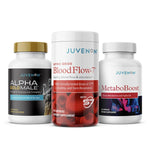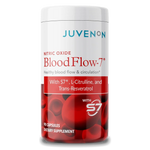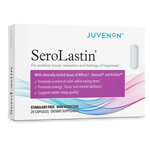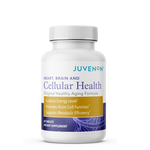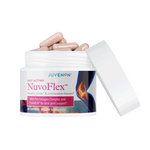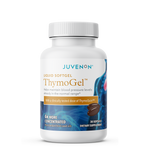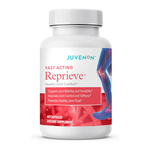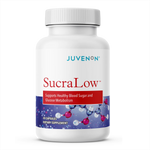
If you have a slow metabolism, you may feel like you’ve been cursed. You may describe yourself as someone who can look at a piece of cake and gain 5 pounds, or maybe you’ve tried countless diets and none of them really seem to stick.
Well, it’s not necessarily that your metabolism is slow. There could be a number of factors at play. What it all boils down to is how efficiently your body can transform food into usable energy, and if your body is able to access and break down stored body fat for energy
In this article, you will learn:
- What metabolism is,
- The biological mechanisms behind “fast” and “slow” metabolisms,
- How your metabolism affects your weight and metabolic disease risk,
- The specific lifestyle factors that influence your metabolism,
- How aging affects your metabolism,
- How to optimize your metabolism using targeted lifestyle changes,
- And how Juvenon’s Cellular Health and Energy Formula supplements can help.
What is your metabolism?
You probably hear references to “metabolism” all the time — especially regarding weight loss. Slow metabolism, fast metabolism, how to speed up your metabolism, and so on — but what exactly does it mean?
Metabolism simply refers to the body’s process of converting raw materials (food) into energy that you can use. Whatever energy you don’t use immediately is stored as either glycogen (sugar in the muscles or liver) or body fat.
A “slow metabolism” most often refers to people who store body fat easily, while a “fast metabolism” refers to people who don’t seem to gain weight. However, the slow and fast metabolism metaphor isn’t entirely accurate — speed doesn’t really have much to do with it.
However, your metabolism is heavily influenced by genetics. Additionally, one of the key drivers of your metabolism is cellular function — which is profoundly affected by lifestyle and environmental factors, age, and hormones. [1]

Optimizing Your Metabolism
Here are several ways that you can start optimizing your metabolism today:
- Eat a nutritious diet that’s rich in antioxidants fromall plant foods especially fruits and vegetables, and low in highly processed or sugary foods.
- Exercise regularly. Aim for at least 150 minutes per week, and a couple of resistance training sessions too.
- Spend time outdoors. Sunlight helps your body synthesize vitamin D, which provides immune benefits, helps strengthen your bones, and plays a role in metabolic health as well.
- Manage your stress and engage in hobbies and activities that bring you joy.
- Take proven supplements, like Juvenon Energy Formula and/or Juvenon Cellular Health.
- Get adequate sleep. Sleep is restorative and helps prevent oxidative damage that can lead to metabolic dysfunction. Most people need about 8 hours per night but the quality of your sleep is more important than the quantity. Managing your total health by adhering to the above lifestyle factors will help you get the right quality of sleep you need.
Juvenon Cellular Health
Juvenon’s Cellular Health is a powerful blend of two key ingredients that can help to restore and optimize your mitochondrial health.
Acetyl-l-carnitine
Acetyl-l-carnitine, also known simply as carnitine, is an amino acid (a building block of protein) that helps your body to be more efficient when metabolizing fat into energy. In this way, it may help you to store less body fat and more effectively utilize stored body fat. [6, 7]
Alpha-lipoic acid
Alpha-lipoic acid is actually a product of the mitochondria and supplementing with it may help your mitochondria function more effectively in converting carbs into energy. It may also help your body to naturally repair damaged mitochondria. [8]
Together, these two “powerhouses” (like mitochondria) ingredients can help to super-charge your mitochondria and restore your cellular function and vitality.
Juvenon Energy Formula
And if you’re looking for something more powerful, or if you’re dealing with fatigue and need a boost of alertness alongside some metabolism-strengthening ingredients, then Juvenon’s Energy Formula may be just what you need.
This product contains:
- Carnitine:Also found in Juvenon’s Cellular Health supplement, this compound helps your mitochondria more effectively transform fat into energy. [6, 7]
- Alpha-lipoic acid:This antioxidant, which is also an ingredient in Juvenon’s Cellular Health formula, helps protect your mitochondria from damage and promote the conversion of carbohydrates to usable energy. [8]
- Vitamin D:A powerful essential vitamin that many people are slightly deficient in. It may help you have more energy. [9]
- Vitamin B12:Vitamin B12 is necessary for healthy red blood cells, which deliver oxygen to your entire body. Low B12 levels are often accompanied by fatigue. [10]
- Biotin:Biotin is another B-vitamin that is important for metabolic function. People with low levels may experience fatigue. [11]
- N-acetyl-l-cysteine:This antioxidant compound offers protective benefits to the mitochondria by guarding against oxidative damage from free radical compounds. [12]
- Creatine monohydrate: A key ingredient in most pre-workout supplements, creatine supplements provide an immediate energy boost and can really help get your blood pumping. [13]
- Green tea leaf extract:With its blend of caffeine and powerful compounds like l-theanine and epigallocatechin gallate (EGCG), green tea exerts potent antioxidant activities. [14]
- Polygonum cuspidatum root extract: This plant extract, from a plant known as Japanese knotweed, is loaded with antioxidants that can help protect the mitochondria from free radical damage. [15]
- Naringin:Found in oranges and other citrus fruits, naringin is an antioxidant that may help to reduce fatigue after exercise — potentially helping you feel more energetic in your active lifestyle. [16]
- Quercetin dihydrate: Quercetin is another powerful antioxidant found in fruits and vegetables, like onions and blueberries. It may also help you feel more alert and less fatigued during exercise. [17]
- Coenzyme Q10:Finally, Coenzyme Q10 is a critical player in the production of energy that takes place in the mitochondria. This process, called the electron transport chain, can’t happen without CoQ10. [18]
This supplement delivers a powerful dose of mitochondria-protective, energy-boosting compounds straight to your cells — helping you feel more alert and youthful, while promoting improved cellular function.
Metabolism, Weight, and Metabolic Disease
If you have always struggled with being overweight or obese, if you gain weight easily, or if you struggle to lose weight, you may feel that you have a sluggish metabolism. Over time, these weight struggles may develop into more serious metabolic diseases, like type 2 diabetes.
However, there are several factors at play. Here are some different factors that may affect your metabolism and cause you to gain or hold on to weight easily, along with some ways to help resolve these factors:
Stress
Stress is one of the most significant, yet underrated, causes of weight gain and metabolic disease.Stress sends your body into “fight, flight, or freeze” mode, which affects your hormones (especially your thyroid – your master metabolic hormone system) and causes a number of changes that predispose you to weight gain. In the ancient past, these changes were advantageous, short-term, and directly contributed to survival. However, in modern times, we are chronically stressed and these changes do more harm than good. Elevated cortisol that chronically stays above normal levels has been shown to contribute to stubborn fat loss.[2]
Hormones
High insulin levels appear to be a key driver of weight gain and metabolic disease. Insulin’s role is in the management of blood sugar levels, but it controls blood sugar by shuttling excess sugar into fat storage. For this reason, many people refer to insulin as the “fat storage” hormone. When your insulin levels are high, your body is continuously converting excess blood sugar into body fat and storing more. At the same time, you’re unable to access your stored body fat to use it for energy. When you’re stuck in this cycle, you must supply your body regularly with quick energy from carbs and sugar, which only leads to more and more fat storage. [3]
Diet
Finally, diet also plays a key role in your metabolic health. Modern Western diets are high in sugar, processed additives, and low-quality ingredients. However, the food we eat provides the very materials that our body needs to survive and that “material” is actually not as much about the macronutrients (should you go low carb or high carb is not really as important!) as it is about the micronutrients (spoiler alert – fat loss has more to do with your minerals and phytonutrient intake). So, in a sense, we really are what we eat. A diet high in sugar and processed foods, therefore, appears to disproportionately lead to weight gain and metabolic disease because it leaves out the microminerals found in nutrient dense real foods. [4, 5]
Additionally, aging plays a role in the cellular changes that may lead to metabolic dysfunction. This is because, as we age, our cells become less efficient at both turnover (the creation of new cells to replace old ones) and mitochondrial function. [1]
The mitochondria are the specialized organelles within every cell in your body that are actually responsible for converting raw material into energy. You may remember that they are known as “the powerhouse of the cell.”
With age, mitochondrial function diminishes. This normal part of aging, however, can be hastened by lifestyle factors like stress and poor diet. These things may increase the body’s oxidative stress burden. [1]
Oxidative stress is caused by free radicals, which can build up in cells and impair mitochondrial function — causing widespread dysfunction, as the cell is unable to produce energy efficiently.
Fortunately, just like lifestyle factors can hasten cellular aging, making the right lifestyle changes can help to nourish your body and your cells to keep them functioning optimally for as long as possible.
Takeaway
Metabolism refers simply to how your body breaks down food and converts it into usable energy, and how well it is able to access stored energy.
However, high stress, high insulin levels, and poor dietary choices can negatively influence your metabolism — contributing to weight gain, fat gain, and an increased risk of metabolic disease.
The key player in energy metabolism is a structure found in each and every cell in your body called the mitochondria. And although aging does naturally reduce mitochondrial function, you can offset much of this by leading a healthy active lifestyle.
To optimize mitochondrial function, be sure to eat an antioxidant-rich diet, get plenty of exercise, get enough sleep, and manage your stress levels.
Finally, Juvenon’s Cellular Health or Energy Formula supplements may be a prudent addition to your daily routine. Both of these products contain carnitine and alpha-lipoic acid, both of which can help your mitochondria burn fat and produce energy more effectively.
Additionally, Energy Formula contains a number of other antioxidant and mitochondria-boosting ingredients to help you feel more energetic and vibrant.
Take comfort knowing that your metabolism is no curse, and that by making a few key lifestyle changes you can make great strides in improving your health and mitochondrial function.
References
- Breitenbach M, Rinnerthaler M, Hartl J, et al. Mitochondria in ageing: there is metabolism beyond the ROS. FEMS Yeast Res. 2014;14(1):198-212. doi:10.1111/1567-1364.12134
- Tomiyama AJ. Stress and Obesity.Annu Rev Psychol. 2019;70:703-718. doi:10.1146/annurev-psych-010418-102936
- Kolb H, Kempf K, Röhling M, Martin S. Insulin: too much of a good thing is bad. BMC Med.2020;18(1):224. Published 2020 Aug 21. doi:10.1186/s12916-020-01688-6
- Mendonça RD, Pimenta AM, Gea A, et al. Ultraprocessed food consumption and risk of overweight and obesity: the University of Navarra Follow-Up (SUN) cohort study.Am J Clin Nutr.2016;104(5):1433-1440. doi:10.3945/ajcn.116.135004
- Lane MM, Davis JA, Beattie S, et al. Ultraprocessed food and chronic noncommunicable diseases: A systematic review and meta-analysis of 43 observational studies.Obes Rev. 2021;22(3):e13146. doi:10.1111/obr.13146
- National Institutes of Health. (2017). Carnitine—Health Professionals Fact Sheet [Fact sheet]. Retrieved from https://ods.od.nih.gov/factsheets/Carnitine-HealthProfessional/
- Gnoni A, Longo S, Gnoni GV, Giudetti AM. Carnitine in Human Muscle Bioenergetics: Can Carnitine Supplementation Improve Physical Exercise?.Molecules. 2020;25(1):182. Published 2020 Jan 1. doi:10.3390/molecules25010182
- Salehi B, Berkay Yılmaz Y, Antika G, et al. Insights on the Use of α-Lipoic Acid for Therapeutic Purposes.Biomolecules.2019;9(8):356. Published 2019 Aug 9. doi:10.3390/biom9080356
- U.S. National Institutes of Health: Vitamin D health professional fact sheet. August 17, 2021. https://ods.od.nih.gov/factsheets/VitaminD-HealthProfessional/
- U.S. National Institutes of Health. Vitamin B12 health professional fact sheet. April 6, 2021. https://ods.od.nih.gov/factsheets/VitaminB12-HealthProfessional/
- U.S. National Institutes of Health. Biotin health professional fact sheet. March 29, 2021. https://ods.od.nih.gov/factsheets/Biotin-HealthProfessional/
- Tardiolo G, Bramanti P, Mazzon E. Overview on the Effects of N-Acetylcysteine in Neurodegenerative Diseases.Molecules.2018;23(12):3305. Published 2018 Dec 13. doi:10.3390/molecules23123305
- Riesberg LA, Weed SA, McDonald TL, Eckerson JM, Drescher KM. Beyond muscles: The untapped potential of creatine.Int Immunopharmacol.2016;37:31-42. doi:10.1016/j.intimp.2015.12.034
- Mancini E, Beglinger C, Drewe J, Zanchi D, Lang UE, Borgwardt S. Green tea effects on cognition, mood and human brain function: A systematic review.Phytomedicine.2017;34:26-37. doi:10.1016/j.phymed.2017.07.008
- Yun-Ting Z, Xiao H, Yun-Zhong C, Jun-de LI, Kun YU. Zhongguo Zhong Yao Za Zhi. 2020;45(18):4364-4372. doi:10.19540/j.cnki.cjcmm.20200525.201
- Zamanian M, Hajizadeh M, Shamsizadeh A, et al. Effects of naringin on physical fatigue and serum MMP-9 concentration in female rats.Pharm Biol.2017;55(1):423-427. doi:10.1080/13880209.2016.1244553
- Lin Y, Liu HL, Fang J, Yu CH, Xiong YK, Yuan K. Anti-fatigue and vasoprotective effects of quercetin-3-O-gentiobiose on oxidative stress and vascular endothelial dysfunction induced by endurance swimming in rats. Food Chem Toxicol. 2014;68:290-296. doi:10.1016/j.fct.2014.03.026
- Mehrabani S, Askari G, Miraghajani M, Tavakoly R, Arab A. Effect of coenzyme Q10 supplementation on fatigue: A systematic review of interventional studies. Complement Ther Med. 2019;43:181-187. doi:10.1016/j.ctim.2019.01.022

